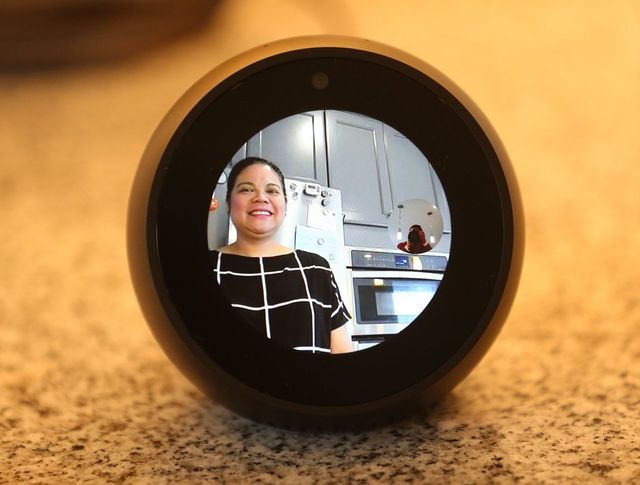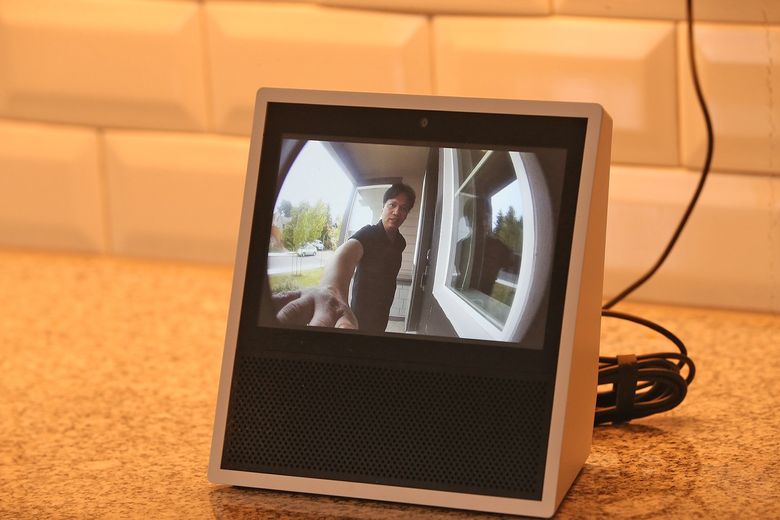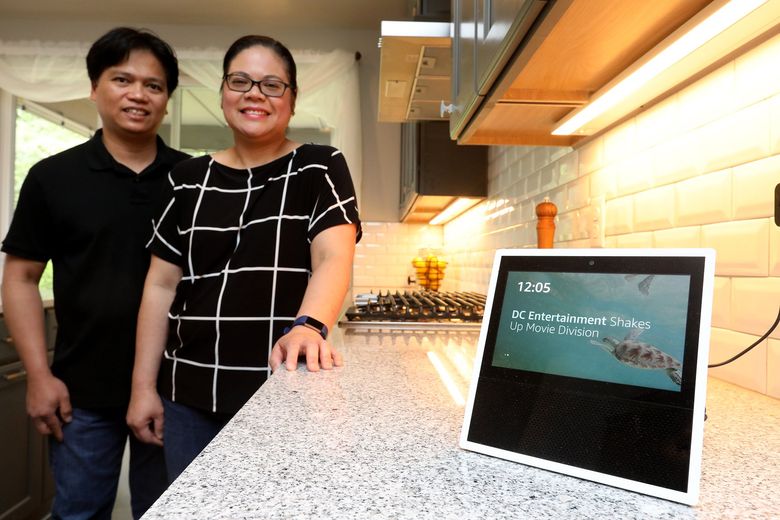
Amazon is working with homebuilders and hoteliers to make its smart speaker and artificial-intelligence system a part of everyday life for new customers. The company has put its engineers to work behind the scenes to make implementation easier, seeing wide market opportunities.
The Maple Valley home that Arnold and Armida Rosales bought came with four bedrooms, three bathrooms, several walk-in closets and Amazon’s Alexa.
The couple were familiar with Apple’s Siri but had never used Amazon’s voice-activated software until they moved into a newly built home that came with it. “We really hadn’t thought about technology in the house,” Arnold Rosales said.
They were pleasantly surprised. The Rosaleses now use Alexa to toggle lights and door locks, and to play music. Their younger son uses the devices to call up and listen to short stories.
“My children love it,” Arnold Rosales said.
The emerging market for smart speakers, and the voice-activated software that makes them tick, is among the most fiercely contested battlegrounds in consumer technology today.
Amazon introduced Alexa in its Echo devices, the cylindrical pairing of speaker and powerful microphone array that first went on sale in 2014. The device was a surprise hit, helping to popularize voice-controlled software in the home.
Deep-pocketed technology giants are trying to chip away at Amazon’s lead, with some success. Google’s Home speaker outsold the Echo lineup during the first three months of 2018, according to Canalys, a researcher, marking the first quarter in which another company sold more smart speaker units than Amazon.
Amazon is trying to hold its advantage in the long term with a hiring spree targeting software engineers, speech and data scientists to build Alexa’s conversation skills. The company this week was seeking about 1,500 workers for its Alexa team.
The Seattle company is also using a playbook that makers of emerging technology — from operating systems to video-game consoles — have relied on to cement their product as the default option: building sales, developer and customer-support teams charged with finding new uses for Alexa, and extending its utility into specific lines of business.
“It’s impressive to watch how many new [hires] have joined Amazon’s team,” said Dave Berger, whose company, Volara, makes software for hotel operators who want to put Alexa in guest rooms. “It’s a testament to the commitment they’re making to voice as a computing medium.”

Table of Contents
ToggleEcho’s functions
Homebuilder Quadrant, based in Bellevue and owned by TRI Pointe Group, has been offering internet-enabled doorbell cameras and thermostats for years, a bet that modern homebuyers would expect — and be willing to pay for — electronics they can toggle from a smartphone instead of a switch.
As builders of smart speakers began to market their own devices as the focal point for all of that technology, Chris Pallemaerts, vice president of operations with Quadrant, looked into the offerings of the main speaker makers — including Amazon, Google and Apple, which is working on the yet-to-be-released HomePod.
The Echo had the widest range of functions and was compatible with the most off-the-shelf smart-home technology, he said. But the biggest differentiator, Pallemaerts said, was Amazon’s in-house installation and repair service, which launched without much fanfare last year.
“The ability for them to go in and teach people, that seemed to be unique,” Pallemaerts said.

Help for homeowners
It was a crew from Amazon that came to the Rosales residence to set up the three new Echo speakers Quadrant offered to each homeowner in the new subdivision.
Pallemaerts found a way to keep up with rivals like homebuilding giant Lennar, which is also including Echoes in new homes.
Amazon doesn’t disclose how many Alexa devices are in use, or in what kind of settings, beyond saying tens of millions have been sold. But its crew added 21 households’ worth of Alexa users in the Rosaleses’ neighborhood.
Hotel-room speakers
Alexa is showing up outside the home, too.
When a technologist with Two Roads Hospitality explored putting Echo speakers in the company’s hotel rooms in January, he did what many people who don’t know how to get in touch with Amazon do: He emailed Jeff Bezos.
The Amazon chief executive didn’t reply himself, but Two Roads heard back from a member of the growing Alexa business-development group, who referred them to Volara, Berger’s company.
Berger had gotten into the Alexa business by accident. A semiprofessional Airbnb host, he was overwhelmed in early 2016 by a guest who asked a lot of questions. “Alexa could be answering these,” he said. “Not me.”
To build software that would do just that, Berger entered an Amazon hackathon, a sort of crash boot camp and competition for developers interested in making applications for Alexa. Amazon’s developer-relations team quickly discovered what he was trying to do, and offered the assistance of the company’s own engineers.
Two years later, Berger’s company, Volara, builds software that about 40 hotels use to manage in-room guests.
One of them is the Thompson, a Two Roads-managed property in Seattle. In-room devices are programmed to respond to common questions — what’s the Wi-Fi password, what good restaurants are nearby. When guests check out, Volara’s software resets the device to default settings for a new, anonymous guest.
Andrew Arthurs, Two Roads’ chief information officer, said the smart speakers give guests a convenient tool and save staff time answering basic questions that could be better spent elsewhere.
“My understanding is Amazon didn’t see the opportunity in hospitality” at first, he said. “Then all of a sudden it clicked, and they realized this is not just homes, but hundreds, or thousands, of hotel rooms.”
Won over
Christopher Lewis didn’t want to like Alexa.
He was familiar with smart speakers and their software from friends’ homes but hasn’t used it much himself, until a speaker showed up in his room at Seattle’s Kimpton Alexis Hotel last year.
Lewis, who travels to Seattle frequently for business, started by trying to fool the device, asking it complicated or inappropriate questions.
“My plan didn’t work well,” he said. “It was better than I thought.”
One morning, while getting ready to leave for a meeting, he found a nontrivial use for the speaker in getting directions and travel time to a meeting.
Lewis doesn’t have an Echo at his home in Portland. But he’s no longer opposed to the idea.
“I found that thing disturbingly handy,” he said.
[“Source-seattletimes”]
| M | T | W | T | F | S | S |
|---|---|---|---|---|---|---|
| 1 | 2 | 3 | 4 | 5 | 6 | 7 |
| 8 | 9 | 10 | 11 | 12 | 13 | 14 |
| 15 | 16 | 17 | 18 | 19 | 20 | 21 |
| 22 | 23 | 24 | 25 | 26 | 27 | 28 |
| 29 | 30 | |||||
























